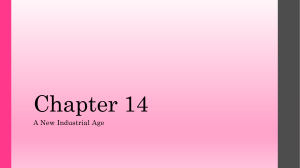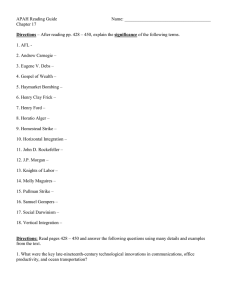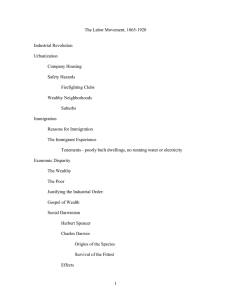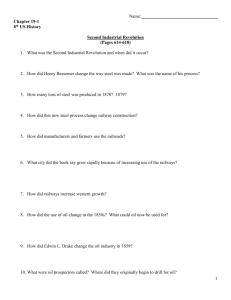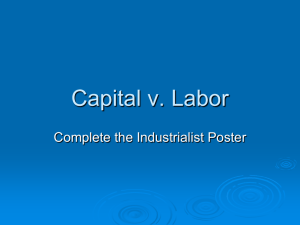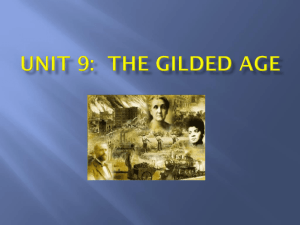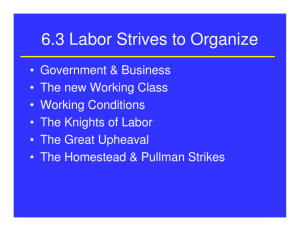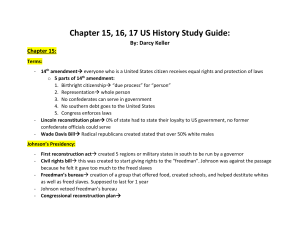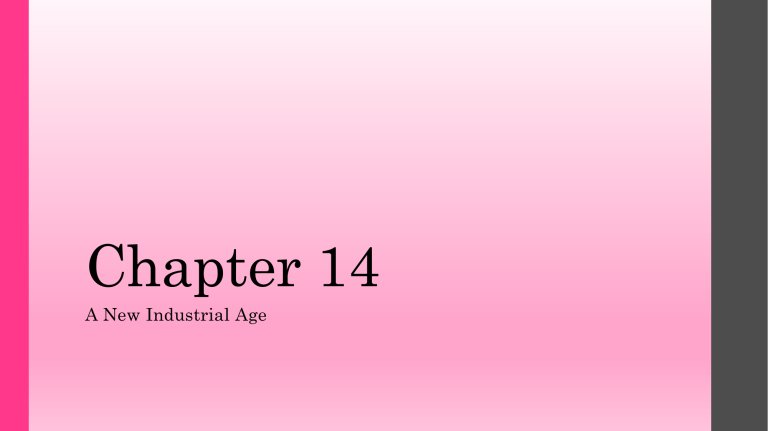
Chapter 14 A New Industrial Age New Inventions and Industry • Edwin L. Drake in 1859 used a steam engine to drill for oil • Oil boom created, lead to a new industry • Coal and Oil production increased • The Bessemer process was invented to inject air and remove impurities and carbon in iron (Iron is used for steel) • Uses for Steel Railroads New construction, Brooklyn Bridge Skyscrapers Inventions Leads to Change • Thomas Edison invented the first light bulb and first system to distribute light • Electric power manned machines time saving machines • Electric streetcars • Industry plants could go anywhere not just near sources of power • Christopher Shoes invented the typewriter Alexander Graham Bell invents the telephone Created new jobs for women The South did not benefit much from this, still recovering, had little money • The Railroads • Expanded migration, industry movement • First Transcontinental RR where the Central Pacific and Union Pacific RR met in Utah Employed Chinese immigrants, Irish workers, desperate Civil War veterans Poor working conditions with diseases and accidents United the Nation C.F. Dowd created the four time zones we have (Eastern, Central, Mountain and Pacific) Increased the iron, coal, lumber, and glass industries New towns and new markets (increased trade) • Grangers vs. RR • Farmers did not like the RR or anyone involved because they took up land and poorly regulated them • They passed Granger Laws which established max passenger and freight rates • Munn v Illinois upheld the Granger Laws of RR regulation by the states Interstate Commerce Act • Later the Supreme Court ruled that states could not set rates for the RR (violated interstate commerce) • Established an Interstate Commerce Commission where the federal government would oversee the RR • Supreme Court then rules that the ICC could not set rates for the RR either • Not until 1906 did the ICC get the power they needed to over see the RR • Mismanagement of the RR led to the Panic of 1893 Andrew Carnegie • 1899 the Carnegie Steel Company was created • Does Amazing He creates vertical integration Where you buy all the suppliers to create your product Coal fields, iron mines, ore freighters, railroad lines He creates horizontal integration Buying other companies in the same product as you Monopolies develop Holding Companies develop (companies literally created to buy out others) • Horizontal and Vertical Integration Social Darwinism • Charles Darwin's theory of biological evolution in “theory of evolution” • Herbert Spencer uses Darwin's biological evolution as an explanation of human society • Economists used this idea to develop that laissez faire is the way to go (federal government does not regulate the market) • Businesses die that don’t do well, poor are poor because they don’t work, and the rich are rich because they do work John D. Rockefeller and Robber Barons • Rockefeller used trusts (same as monopolies) • Rockefellers Standard Oil Company produced 2-3$ of oil, and 90% of the refining business • Received a lot of profits because his employees were paid very low wages • Drove his competitors out of business by selling under them, then increased his prices • Called robber barons: was a derogatory term used in social criticism and applied to some wealthy and powerful 19th-century American businessmen, like Carnegie, Rockefeller, and JP Morgan Sherman Antitrust Act--stop • Government was concerned that free competition was being stopped • The Act mad it illegal to form a trust (monopoly) that interfered with free trade • It was still hard to prosecute the companies because the act did not clarify what a “trust” was • Companies like the Standard Oil would just separate into single companies Labor Unions Emerge • Did not exempt any race or gender • Long hours, seven day workweek • Ex. Seamstresses worked 12hrs 6 days a week • NO vacation, workers compensation, or sick leave • Dirty unventilated working conditions • Sweatshops • Dangerous or faulty equipment, little to no protective gear • Poor wages, very low considering what they worked through Early Labor Unions • 1st large scale union was the National Labor Union (NLU) • They persuade Congress to legalize 8 hr. work days • Knights of Labor: open to all workers, supported 8hr work days, equal pay, strikes were a last resort • American Federation of Labor (AFL) led by Samuel Gompers • They focused on negotiations between representatives of labor and management • They also used strikes as a major tactic Early Labor Unions • Socialism: government control of businesses and equal distribution of wealth • Industrial Workers of the World (IWW) aka the Wobblies • Led by Bill Haywood • Made of miners, lumber workers, and dock workers • Promoted Socialism Strikes Great Strike of 1877 Baltimore and Ohio RR (B&O) workers protested their 2nd wage cut RR Traffic was stopped for over a week Federal Troops end the strike, workers were interfering with interstate commerce The Haymarket Affair Gathering at Chicago's Haymarket Square to protest police brutality A striker had been killed and some wounded at a McCormick Harvest Plant The crowd was dispersing when police arrived Someone tossed a bomb into the police line Police fired at the workers, 7 police and some workers died 3 speakers and 5 protestors charged with inciting a riot 4 hanged and one committed suicide Many turn against the labor movement after this • Homestead Strike • Homestead Strike • At Carnegie Steel Company Homestead plant in PA • President Henry Clay Frick cuts wages leading to the strike • Workers were working in terrible conditions as well • Frick hires guards to protect the plant • 3 detectives and 9 workers dead • The strike loses support and falls to the company Pullman Strike • Pullman Company created RR cars • Pullman Company laid off more than 3,000 and cut wages of 2,800 after Panic of 1893 • Wages were cut but the cost of housing had not decreased • Pullman refused any negotiations with the employees • Federal troops sent in • Most of the strikers fired • All others blacklisted and could never get a job with the RR again
